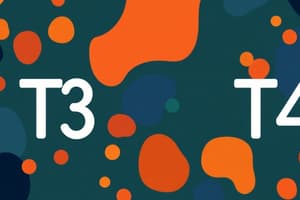Podcast
Questions and Answers
Which hormone does the thyroid gland produce?
Which hormone does the thyroid gland produce?
- T1 and T2
- T4 and T5
- T3 and T4 (correct)
- T2 and T3
What are the symptoms of hyperthyroidism?
What are the symptoms of hyperthyroidism?
- Tachycardia, cardiac arrhythmias, body wasting, nervousness, tremor, and heat intolerance (correct)
- Frequent urination, increased thirst, and hunger
- Muscle cramps, dry skin, and brittle nails
- Bradycardia, cold intolerance, mental and physical slowing
What medication is preferred for hypothyroidism treatment?
What medication is preferred for hypothyroidism treatment?
- Levothyroxine (T4) (correct)
- Methimazole
- T3
- Propranolol
Flashcards are hidden until you start studying
Study Notes
Thyroid Hormones: Synthesis, Mechanism of Action, and Treatment
- The thyroid gland produces the two major hormones, T3 and T4, which maintain optimal metabolism for normal growth and maturation.
- Hypothyroidism, inadequate hormone secretion, causes bradycardia, cold intolerance, mental and physical slowing, and mental retardation and dwarfism in children.
- Hyperthyroidism, excess hormone secretion, causes tachycardia, cardiac arrhythmias, body wasting, nervousness, tremor, and heat intolerance.
- TSH controls thyroid function, and TSH action stimulates iodide uptake by the gland and oxidation to iodine followed by iodination of tyrosines on thyroglobulin.
- Antibodies to thyroid peroxidase are diagnostic for Hashimoto thyroiditis, a common cause of hypothyroidism.
- T4 is enzymatically deiodinated to T3, which enters the nucleus and attaches to specific receptors, promoting RNA formation and protein synthesis responsible for T4 effects.
- Food, calcium preparations, iron salts, and aluminum-containing antacids can decrease T4 absorption.
- Levothyroxine (T4) is preferred over T3 for hypothyroidism treatment, better tolerated, and dosed once daily, achieving steady state in 6 to 8 weeks.
- Toxicity is related to T4 levels and manifests as nervousness, palpitations, tachycardia, heat intolerance, and unexplained weight loss.
- Thioamides, such as PTU and methimazole, inhibit oxidative processes and condensation of iodotyrosines to form T3 and T4, and PTU also blocks peripheral conversion of T4 to T3.
- A pharmacologic dose of iodide inhibits iodination of tyrosines and hormone release, and iodide is used to treat thyroid storm or before surgery.
- β-Blockers, such as metoprolol or propranolol, are effective in blunting the widespread sympathetic stimulation that occurs in hyperthyroidism and used to treat thyroid storm.
Studying That Suits You
Use AI to generate personalized quizzes and flashcards to suit your learning preferences.



